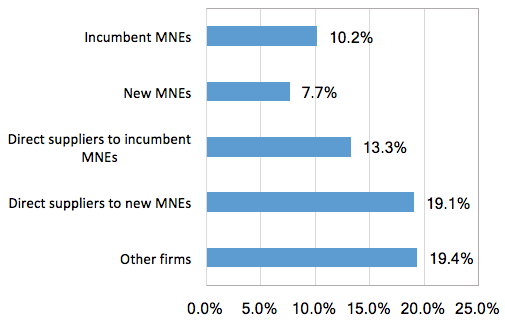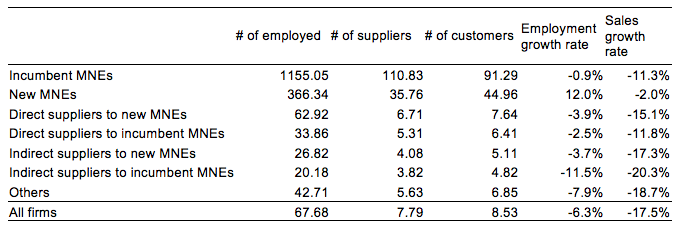Foreign direct investment has generally been found to have positive effects for firms in their home country. There are, however, concerns about potential negative effects for other domestic firms in the investing firm's supply chain. This column uses Japanese firm-level data to explore the supply chain effects of foreign direct investment. Foreign direct investment does not appear to have adverse effects on domestic transaction networks. Rather, the positive effects of firms' foreign investing are found to spread to the whole economy through their supply chains.
It has been well known that firms' foreign direct investment (FDI) does not necessarily have negative effects on their performance in their home country. In regard to the effect on productivity, while Navaretti et al. (2010) in their study on Italy and France and Hijzen et al. (2011) in their study on France demonstrated that horizontal FDI improves domestic productivity, Hayakawa et al. (2013) in their study on Japan found significant positive effects on productivity in the case of vertical FDI. As for the impact on sales and employment, Navaretti and Castellani (2011) found positive impacts on sales and employment through both horizontal and vertical FDI. Hijzen et al. (2011) and Hayakawa et al. (2013) use French and Japanese firm-level data, respectively, and also found that both horizontal and vertical FDI by French and Japanese firms increase domestic employment. In contrast, Debaera et al. (2010) in their study on Korea reported not finding any positive impact on employment through either FDI type.
On the other hand, there is also concern that domestic firms which transact with FDI firms may suffer from negative impacts. Once firms start to invest and expand their production abroad, they may reorganise sales and procurement strategies in their home country. Some of their suppliers may follow suit and start to invest abroad to maintain a transaction relationship. However, small and medium-sized suppliers with financial constraints could have difficulty in following, and lose the transaction relationship. Also, the expansion of production abroad potentially increases the demand for domestic suppliers and strengthens the transaction relationship with them. For example, Ito and Tanaka (2013) investigated the effect of overseas production expansion by multinational enterprises (MNEs) on their suppliers' employment and found a positive impact. Namely, the effect on the first-tier suppliers is not necessarily negative, either.
The internationalisation of firms can have significant impacts on the economy through supply chain linkages. The above change in the first-tier suppliers will affect business activities in their suppliers (i.e. second-tier suppliers), of which the change has further influence on subsequent suppliers' activities. Through such input-output linkages, internationalisation by some firms can affect the entire economy. To examine this influence through supply chains, we conducted a comparison of firm performance among FDI firms, their first-tier suppliers (‘direct suppliers'), their second-tier suppliers (‘indirect suppliers’), and other firms (Hayakawa and Matsuura 2017). We used a unique firm-level survey in Japan that contains information on the inter-firm transaction network matched with FDI data. Our findings can be summarised as follows.
First, we examined the suppliers' probability of stopping transactions according to customer types. Customers are classified into four groups. FDI firms include ‘new MNEs’ (i.e. invested for the first time during 2006-2011) and ‘incumbent MNEs’ (i.e. already having overseas affiliates as of 2006). Among non-FDI firms, if at least one of their top three customers are MNEs, they are regarded as the ‘direct suppliers’ to MNEs. The remaining firms are referred to as ‘other firms.’ We estimated a probit model of transaction ties being broken off and then calculated the predicted probability of stopping transaction ties between suppliers with average attributes and their customers. The probability according to customer types is shown in Figure 1. For example, the probability of breaking ties with MNEs is 10-12% lower than with other firms. On the other hand, the probability of stopping transactions with the direct suppliers of incumbent MNEs is 6% lower than with the other firms, while the case of the direct suppliers of new MNEs is not different from that of the other firms.

In sum, there is no evidence that customers' FDI makes them more likely to suspend their domestic transactions. Rather, transaction ties with MNEs are more persistent than those with other firms, although this effect becomes weak for transactions with direct suppliers. These results may indicate that firms' FDI strengthens their ties with existing transaction partners due to the rise of their production abroad and input demand. Subsequently, the enhancement of ties between MNEs and direct suppliers leads to stronger ties between direct and indirect suppliers. In short, firms engaging in FDI do not destroy their transaction networks in the home country.
Next, Table 1 compares firm performance according to firm type. In addition to MNEs and the direct suppliers, the indirect suppliers are defined as the following—among firms that are neither MNEs nor direct suppliers of MNEs, if at least one of their top three customers are the direct suppliers to MNEs, they are regarded as the indirect suppliers to MNEs. Clear differences in firm size in terms of the numbers of employees and suppliers across firm types are shown. Although it has been well known that MNEs are relatively ‘large’, the direct suppliers also have relatively large numbers. On the other hand, indirect suppliers' size is not so different compared with other firms. A similar order can be found in the growth rates of employment and sales. More importantly, we found similar results even in additional analysis addressing causality issues. In our paper, we show investing abroad improves not only the focal firm's performance but also that of their direct and indirect domestic transaction partners.

These results lend support to policies that encourage firms to invest abroad. The positive effects of firms' foreign investing are found to spread to the whole economy through their supply chains. In this sense, outward FDI may have much larger effects on the macro economy than what has been assumed. The effects of FDI on focal firms themselves may account for only a small fraction of the wider effects. Policies that increase outward FDI will contribute to enhancing economic growth both abroad and at home.
Editors' note: The main research on which this column is based first appeared as a Discussion Paper of the Research Institute of Economy, Trade and Industry (RIETI) of Japan.
This article first appeared on www.VoxEU.org on July 9, 2017. Reproduced with permission.



